Rising to the challenge: Climate action in the Arab region
September 28, 2023
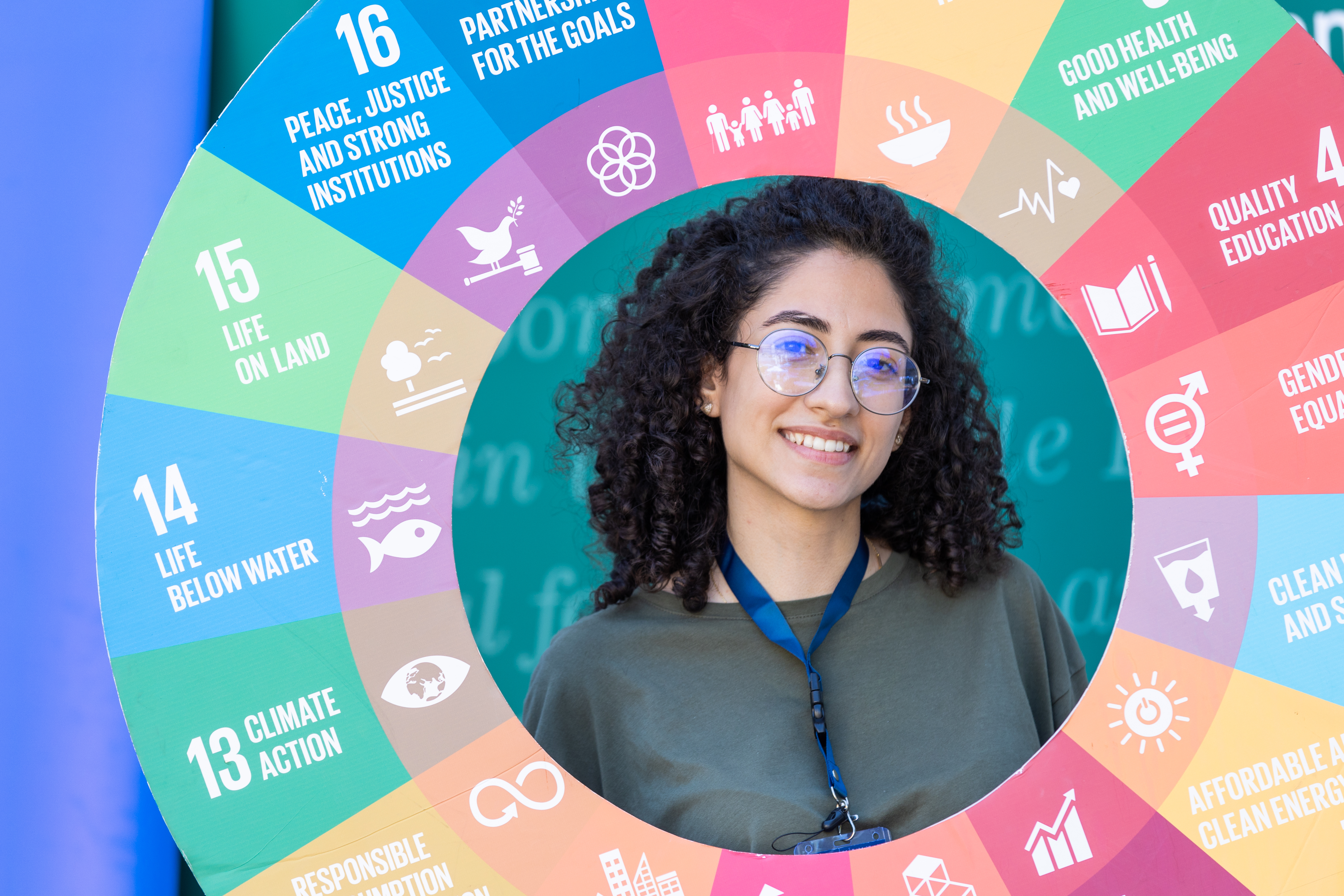
Climate change is posing a major challenge to sustainable development in the Arab States region, disproportionately affecting the poorest and most vulnerable, many of whom are women. Extreme weather and natural disasters displaced three times as many people as wars did in 2019. More than 95 percent of these natural disasters were the result of weather-related hazards such as storms and floods.
Recently, Libya was struck by an unprecedented storm and resulting in thousands of casualties and widespread destruction of infrastructure and homes. Thousands of people are still missing. This disaster once again highlighted the urgency of investing in climate action and climate resilience.
Temperatures in the Arab States region are increasing twice as fast as the global average due to climate change. Droughts are already becoming more frequent and severe, exacerbating the challenges faced by the agricultural sector, including water scarcity. By 2050, climate-related water scarcity could lead to economic losses equivalent to 14 percent of the region’s GDP. Moreover, 45 percent of the total agricultural area in the region is exposed to salinity, soil nutrient depletion, and wind-water erosion. Water availability and agricultural productivity could decline by a further 30 percent by 2050.
Another prominent threat arising from climate change is climate-induced displacement, driven by both drought and rising sea levels. Approximately 9% of the population living in coastal areas in the Arab States region resides at altitudes within five meters or less of sea level.
To bolster climate resilience, countries in the region have revised their Nationally Determined Contributions (NDCs) under the Paris Agreement to be more ambitious, committing to increasing investments in climate action and climate resilience.
Addressing climate change necessitates collective and concerted efforts from all sectors of society. It is crucial that everyone plays an active role in climate action to achieve the Sustainable Development Goals.
What does Goal 13 of the SDGs focus on?
Goal 13 of the SDGs focuses on Climate Action, aiming to strengthen resilience and adaptive capacity to climate-related hazards and natural disasters in all countries and to integrate action on climate change into national policies, strategies and plans.
As climate change increasingly threatens the environment, many countries are taking initiatives to encourage people to participate in climate action. Learn more about how Arab countries are acting on climate change.
Egypt is taking action to protect Delta from climate change
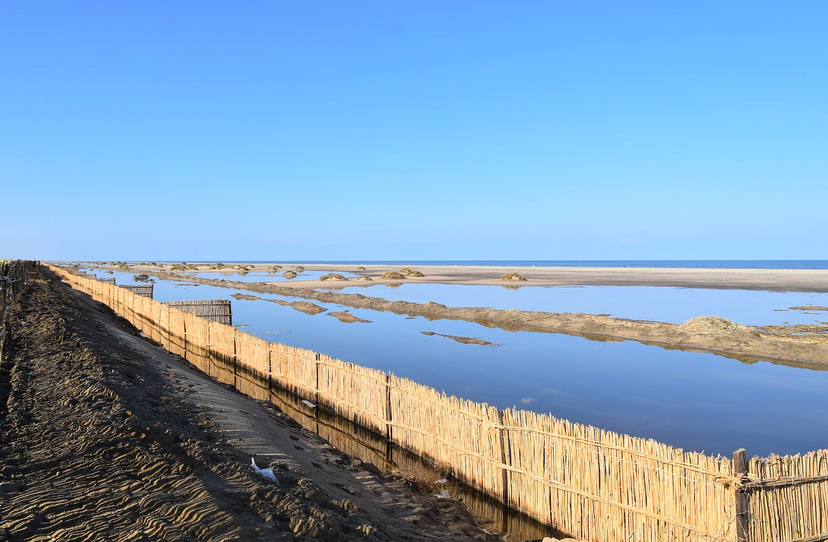
The Nile Delta is home to 18 million citizens – nearly a quarter of Egypt’s population — as well as countless businesses, industries, farms and more. According to a 2007 report by the Intergovernmental Panel on Climate Change (IPCC), the Nile Delta is one of the most vulnerable areas in the world when it comes to sea level rise, extreme weather and other factors exacerbated by climate change. The report shows that a rise in water levels in the Mediterranean Sea could submerge the entire Nile Delta.
This region accounts for more than half of Egypt’s economic activity through agriculture, industry and fishing. The Nile Delta alone contributes about 20 percent of Egypt’s GDP. Egypt studied the results and worked with international partners on solutions to protect vulnerable areas and their people.
In 2020, Egypt, through the Ministry of Water Resources and Irrigation, partnered with the United Nations Development Programme (UNDP) and the Green Climate Fund (GCF) – the world’s largest dedicated climate fund – to launch a new climate project lasting through 2025.
The project will protect 17 million people from coastal flooding by installing 69 kilometers of low-cost dikes in the Nile Delta and the northern coast. The dikes will be stabilized with a combination of stones and native plant species to promote dune growth by capturing and stabilizing blown sand. These coastal protection measures reuse existing dredged material that would otherwise have ended up in the marine environment.
Jordan unleashes the power of women in climate action
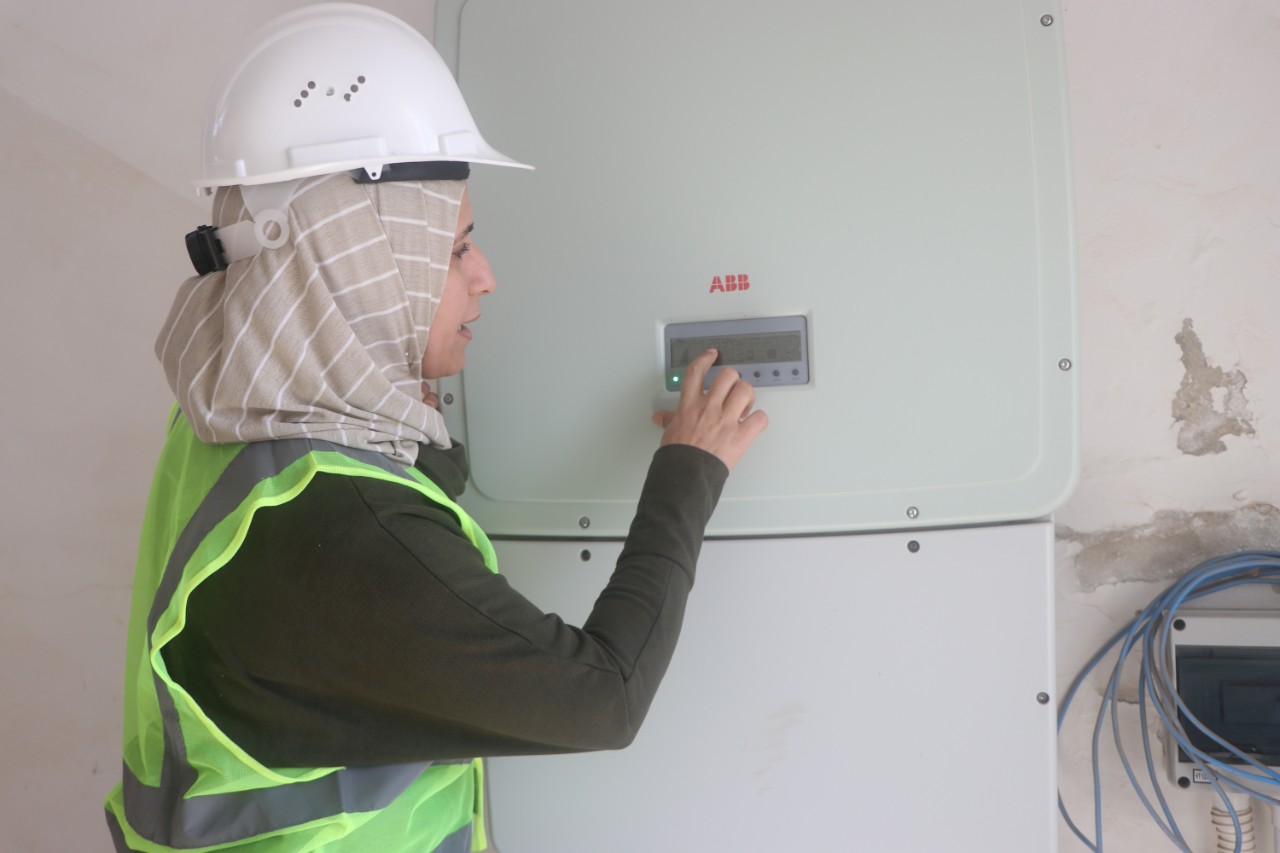
Women and girls are more vulnerable and affected by disasters and conflict. Yet they are largely ignored in the development of solutions and their capabilities are often underutilized. They play an important role in the sustainable energy sector and are a critical part of the solution, leading efforts against climate change through adaptation, mitigation, and evidence-based action.
Jordan faces severe climate change risks, exacerbating water scarcity in the country and impacting the safety, health, and livelihoods of rural and urban households.
From Deir Alla Near Eastern town in Balqa Governorate, Basma began her journey leading climate action in the energy sector at the Ministry of Energy and Mineral Resources. She heads a key department of the Jordan Renewable Energy & Energy Efficiency Fund which serves as a connection point between the community and the Fund. The Fund leads national efforts to optimize and utilize energy consumption by providing the necessary resources to advance and implement sustainable solutions to improve energy efficiency and increase the use of renewable energy in coordination with local and international institutions and stakeholders.
“I want people to look at me as a qualified engineer in the energy sector, who is an expert in the field, and not criticize or observe me as a woman”, Basma said. As the head of the division in the ministry, she runs two main projects in Amman, one of them being with the healthcare sector.
Morocco is reducing greenhouse gas emissions
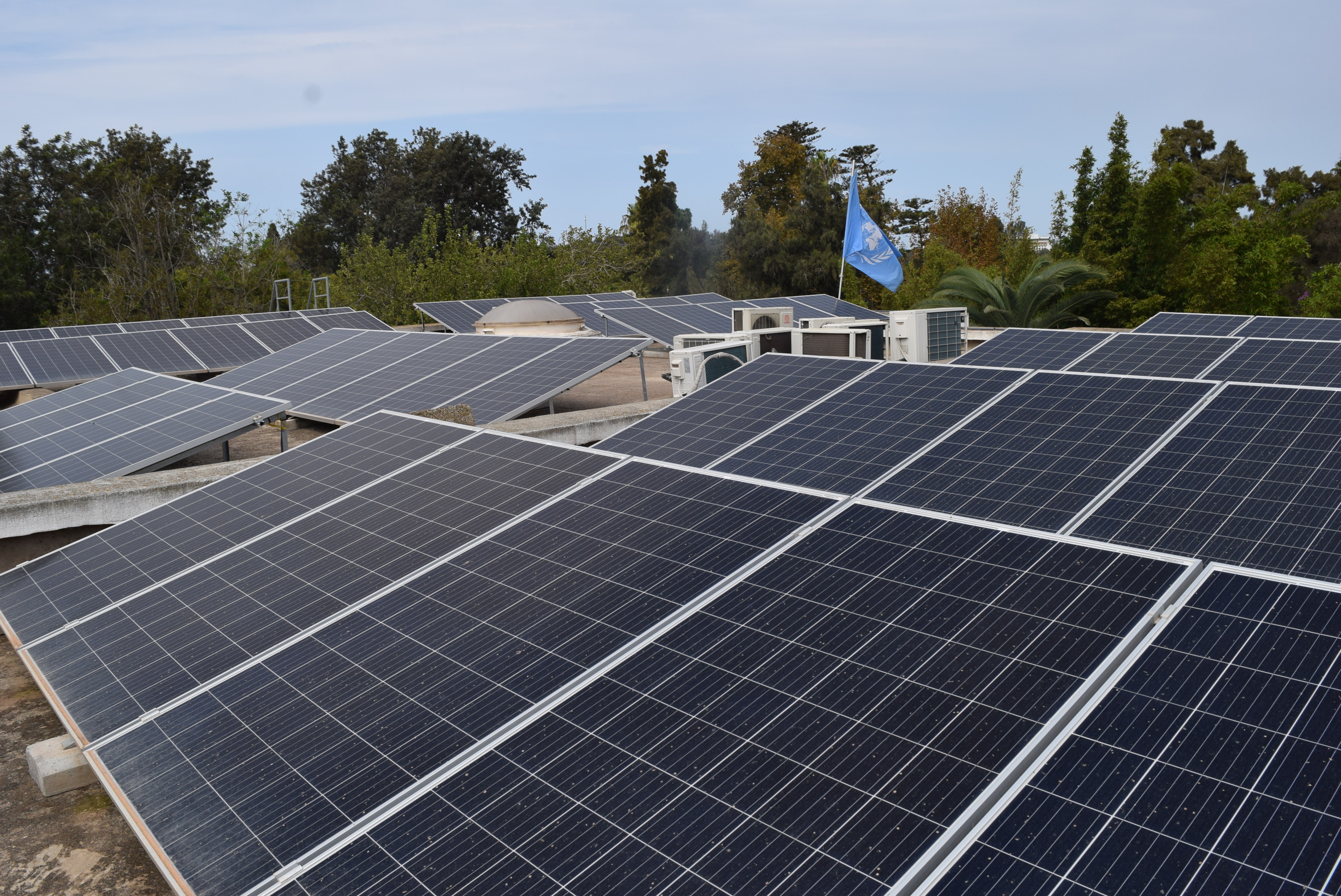
UNDP Morocco implemented several initiatives to minimize the environmental impact of its operation by eliminating the use of plastic bottles, introducing water dispensers, recycling of used paper and cardboard and the installing exterior lighting in the parking lot powered entirely by solar energy.
UNDP Morocco installed 60 400 Wp monocrystalline solar panels on the roof of its building, developing a total peak power of 24 kW to supply 33% of electricity needs.
UNDP Morocco aims to increase the capacity of electricity produced by 50% through the acquisition and installation of additional solar panels.
Somalia is building a climate- resilient pathway
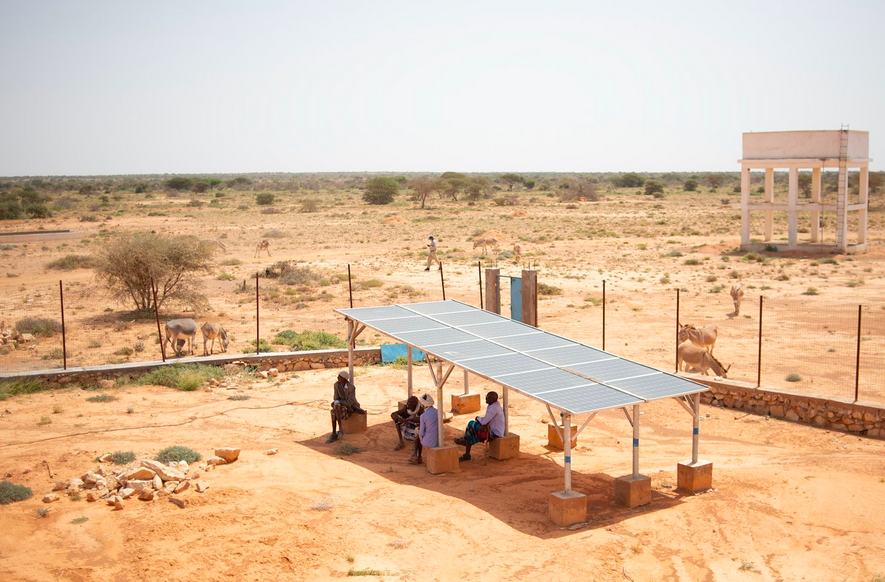
Climate change is having a profound impact across Somalia. More frequent droughts and flash floods are causing soil erosion, crop failure, and livestock deaths in a country where two out of three people depend on subsistence agriculture.
Across Somalia, climate change is altering seasons, worsening natural disasters and leading to more extreme weather events.
With funding from the Global Environment Facility Least Developed Countries Fund (GEF) and support from the United Nations Development Programme (UNDP), people in Somalia are adopting new climate-smart practices to adapt to these urgent challenges and find a climate-resilient path forward.
Through the GEF-funded project supported by UNDP Somalia, Puntland’s Ministry of Environment, Agriculture and Climate Change has constructed 10 new dams that provide camel herders, their livestock and the wider community with clean water. The new earth dams have water troughs and elevated water tanks powered by solar power systems. These allow local communities to access clean water year-round and manage water shortages during dry seasons and droughts.
Syria is empowering women in energy sector
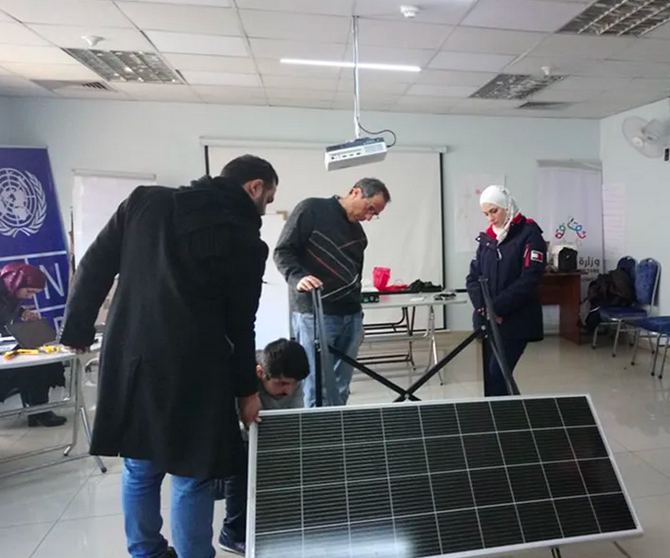
More than a decade of crisis has damaged or destroyed Syria’s critical civilian infrastructure and services, including electricity, water supplies, schools, and health facilities. Power outages are now part of everyday life in Syria. 30 percent of the population has electricity for only two hours a day. Sometimes even less.
UNDP Syria implemented the "Women and Renewable Energy" project with the generous support of the Government of Japan and the UN Response and Recovery Fund. Women received specialized training on solar panels, solar pumping systems and technologies, and innovative solutions to create green livelihood opportunities to encourage women to become more involved in renewable energy.
Working closely with a local women's network, UNDP has identified the most vulnerable and capable women from host and IDP communities to participate in the Women and Renewable Energy Project. The project aims to improve the lives of women and their communities and create a safe environment for women to discuss the challenges they face due to gender stereotypes and their impact on women’s professional development.
230 women applied to participate in the project, 40 of whom were selected to attend soft skills training. “The training I received on leadership, communication, negotiation, social marketing, digital literacy, and other important subjects made me realize the number of skills I was previously lacking and it’s starting to impact my personality and home life in a positive way.” said Tamara, 29.
So far, UNDP Syria has installed 72 solar collectors in its Damascus Country Office, generating 51,000 kilowatt hours (kWh) per year and heating 600 liters of water daily. By shifting from non-renewable energy sources to renewable energy sources, we can save 6,375 liters of fuel and reduce greenhouse gas emissions such as carbon dioxide by 16,830 kilograms annually.
Women are innovating solutions for climate change in Yemen
Climate change is increasingly adding to the difficulties faced by Yemenis, particularly in rural areas that depend on agriculture. The country is not only experiencing more extreme and prolonged droughts, but also flooding that washes away agricultural infrastructure and fertile soil. This leads to further food insecurity as climate events become more severe and unpredictable.
Youth are an important resource to help Yemen achieve the SDGs, as they make up a large part of the community. Many young women have developed new projects to advance climate action in Yemen.
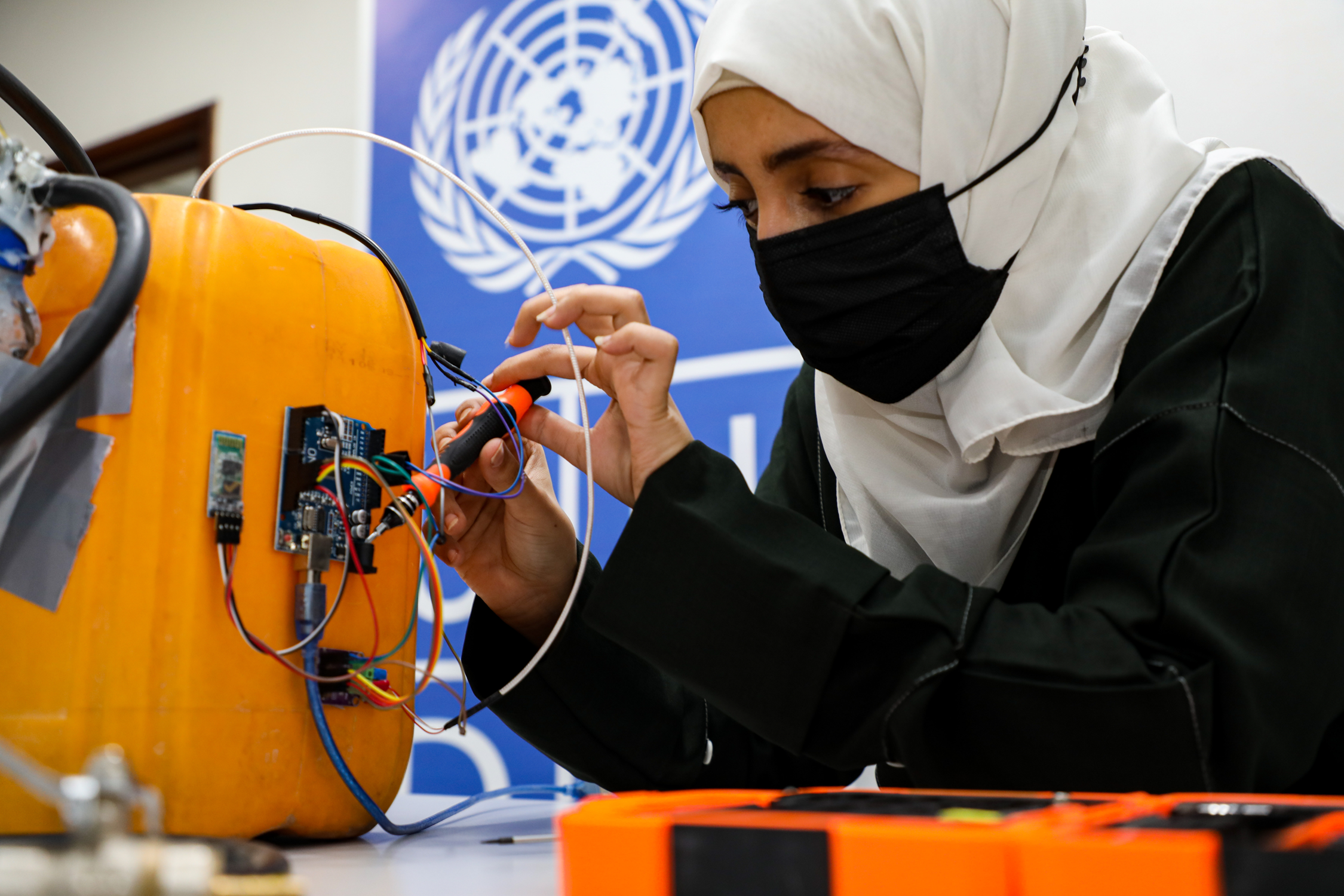
Nada Al-Mashdali, 26 years old, owns and operates a biogas production project that produces biogas – a clean, alternative energy – and organic fertilizer from recycling food waste. She has produced an innovative electronic device to measure temperature to help increase the production of biogas, organic fertilizer, and gas pressure density which can be monitored through a mobile application. UNDP Yemen’s Youth Leadership Programme supported her to implement her project by building her capacity on the SDGs and connecting her with experts and partners.
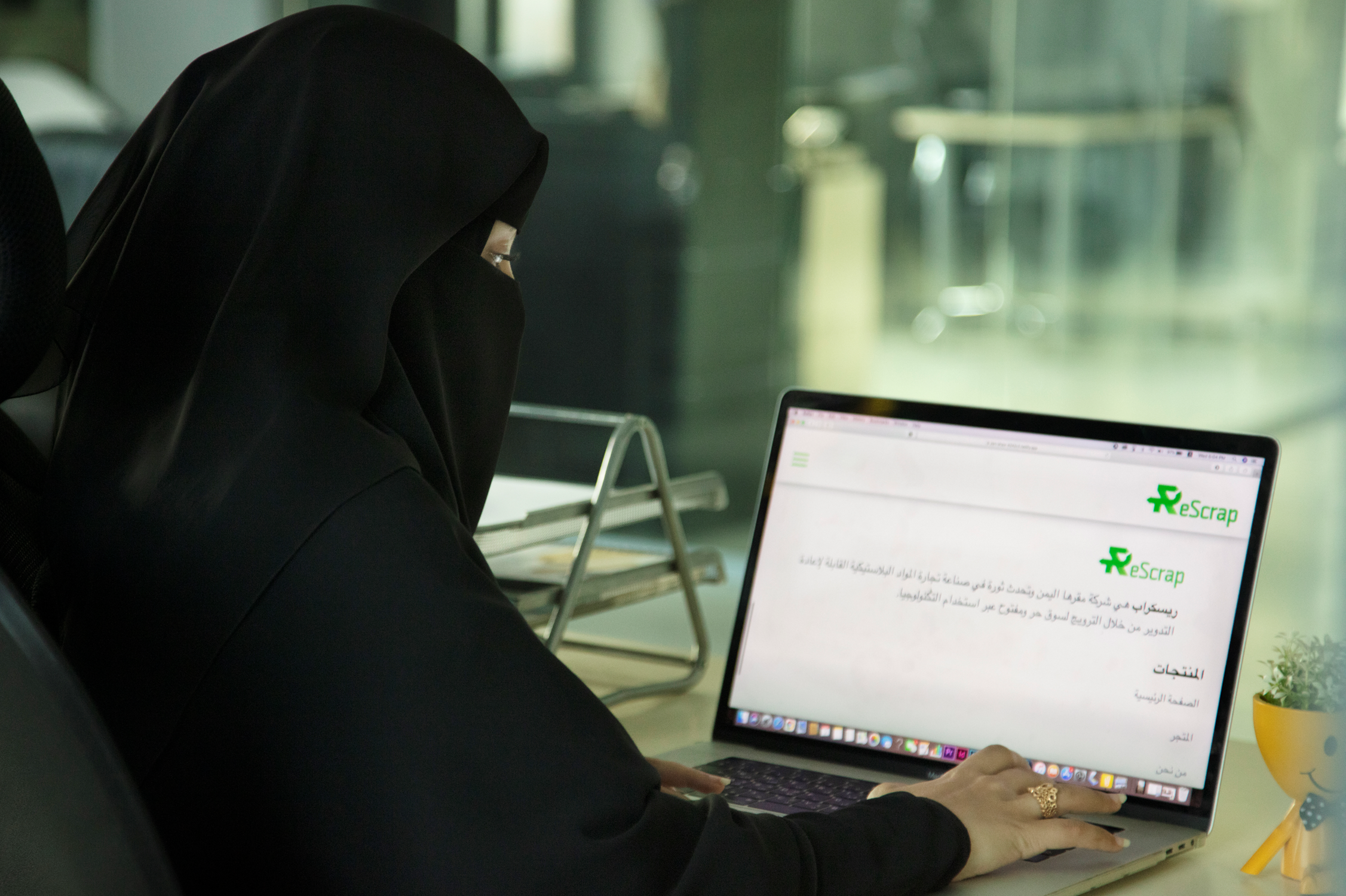
Eshraq Al-swoidi, 24 years old, launched an initiative targeting children and students to help increase their awareness of climate change by providing them with an entertaining, yet educational, methods to help them play their part . She encourages school students to be part of climate action by creating student activities like planting trees and creating activity-based games and animations to inform them about the importance of afforestation and its role in reducing the dangers of climate change. Eshraq believes that the Youth Leadership Programme was the turning point in her life where she was exposed to the idea of climate change.

Young people are some of the most vulnerable to the lifelong environmental effects caused by climate change and are often excluded from influence in national decision-making. UNDP’s Youth Leadership Programme is supporting young people in the Arab States region to become agents of positive social change and create solutions for sustainable development toward climate action.
More action is still needed to combat climate change
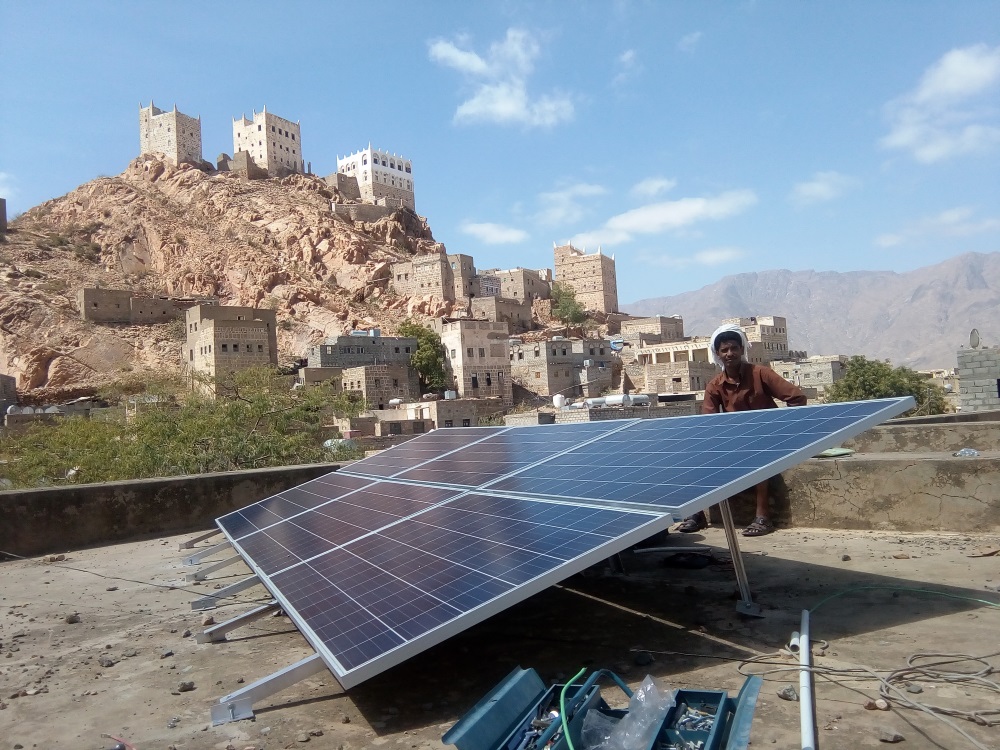
People should realize the negative impact of climate change on their lives and on the planet. We only have one planet, and we need to protect it for the next generation. Young people and women should be more engaged and lead the fight against climate change to achieve a better, sustainable future. Together with our partners, we must do more to support innovative solutions and accelerate the implementation of the SDGs.
Stay tuned to the hashtag #Act4SDGsAR to learn how Arab countries are working to achieve the Sustainable Development Goals by 2030.

 Locations
Locations